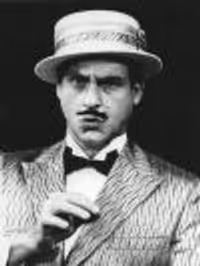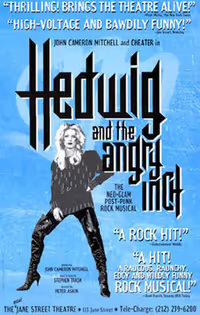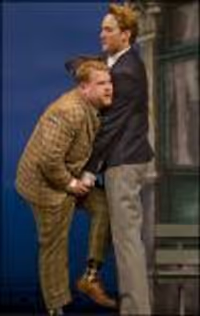Evil Male Characters in Drama?
bobs3
Broadway Legend Joined: 4/8/12
#25Evil Male Characters in Drama?
Posted: 2/17/13 at 12:19amI disagree about Creon in Antigone. He believes in the law and is upholding the law whether one likes the law or not.
AwesomeDanny
Broadway Legend Joined: 7/30/09
#26Evil Male Characters in Drama?
Posted: 2/17/13 at 12:52am
I disagree about Boss Finley in Sweet Bird of Youth. He certainly believes that what he is doing will protect his daughter after the harmful things that she has experienced.
It is really hard to find truly evil characters. By your definition, they must have no justification for their actions, which makes for fairly dull, two-dimensional characters, which most playwrights try to avoid.
#27Evil Male Characters in Drama?
Posted: 2/17/13 at 3:06amSince the OP's initial example of an evil character was Regina in Little Foxes, I'd like to point out that her brothers Oscar and Ben are even crueler and more greedy than she is.
#28Evil Male Characters in Drama?
Posted: 2/17/13 at 3:53am
I disagree about Creon in Antigone. He believes in the law and is upholding the law whether one likes the law or not.
Absolutely. And he does so not for the sake of law for its own sake, but because he believes the law is the only thing that holds society together.
I think the OP needs to define evil. Does he mean those who take pleasure in cruelty, i.e., sadists? Or does he mean those who do evil out of selfish motivation? Or all those who cause pain to others, even if their motivation is noble?
Iago does seem to be the gold standard of villainy. He is motivated by nothing but envy.
#29Evil Male Characters in Drama?
Posted: 2/17/13 at 4:44am
^^^^
Or possibly jealousy. Or impotence. Or latent homosexual attraction. There's a lot of theories flying around as to Iago's motivations, but yes, surface-wise, it's mostly envy.
If someone put a gun to my head and told me to pick the most blatantly evil character in Shakespeare, I'd probably give the prize to Jack Cade in Henry VI part II. There are certainly more malevolent characters (Don John in Much Ado) or more successfully Machiavellian ones (pretty much EVERYONE in the history plays, especially Richard III and his dad, the Duke of York) but Jack Cade is the one who terrifies me. He lies his way into a position of power, assembles an army of drunken malcontents, and reigns havoc on the entire kingdom for the next act. He kills anyone who is more educated than him, anyone who out-argues him, or anyone who merely looks at him wrong. His rabble, intent on killing anyone who can read, would be funny if they weren't so scary, and Cade is there egging them all on.
And you know why he, rather than Aaron the Moor or Edmund or Iago, is the one that scares me? Because he was real. This actually happened.
#30Evil Male Characters in Drama?
Posted: 2/17/13 at 5:45am
A few GIRLS:
Mary in The Children's Hour
Rhoda in The Bad Seed
But I agree with the above sentiement: MOST evil people/characters believe in what they do/think. (Think of the Religious Right.)
#31Evil Male Characters in Drama?
Posted: 2/17/13 at 6:34am
Truly evil characters would be boring and ineffective. A great villain needs to believe what they are doing is absolutely right and good to be effective. A lot of the characters mentioned in this thread may not be totally evil, but there are great villains because they are doing something very bad under the delusion that they are on the side of good.
As for an evil male character in a drama, try The Devil in A Bright Room Called Day by Tony Kushner. He's summoned into a German apartment at the peak of the political battle between the communists and fascists before World War II. He threatens the characters with visions of unavoidable war, chaos, and corruption that he has created. His entire purpose on Earth is forcing humans to question what they can know and trust and he revels in it.
Updated On: 2/17/13 at 06:34 AM
Marcellus2
Chorus Member Joined: 2/16/12
#33Evil Male Characters in Drama?
Posted: 2/17/13 at 12:53pmI thought of saying Roy, but I don't think he's completely evil. He does show some kindness to Joe. Mind you, it's to get him to go to Washington and vouch for him, but it still counts.
FindingNamo
Broadway Legend Joined: 7/22/03
#34Evil Male Characters in Drama?
Posted: 2/17/13 at 1:30pmPlus he wants to pork Joe and stick his reptilian tongue into some Mormon mouth.
#36Evil Male Characters in Drama?
Posted: 2/17/13 at 1:41pmWhat about the Ewells in To Kill a Mockingbird?
#37Evil Male Characters in Drama?
Posted: 2/17/13 at 2:11pm
>>> I thought of saying Roy, but I don't think he's completely evil. He does show some kindness to Joe. Mind you, it's to get him to go to Washington and vouch for him, but it still counts.
Pressuring Joe to go to Washington to cook the books? How is corrupting someone kindness?
And look at the cruel things he said to Belize who, as a nurse, was actually helping him. And look at his glee after he tricked Ethel Rosenberg to pity him and sing for him. That character was evil and cruel.
#38Evil Male Characters in Drama?
Posted: 2/17/13 at 3:53pmHe gives him his blessing when he knows he's about to die. There is some compassion there.
#39Evil Male Characters in Drama?
Posted: 2/18/13 at 10:56am
I'd argue Tartuffe is evil, considering that his motives are completely selfish and there is no redemption to his character whatsoever, if I recall correctly.
I know he's been mentioned, but it bears repeating (with quote!) that Don John in Much Ado is pretty out-and-out about it, even by Shakespearean standards: "in this, though I cannot be said to be a flattering honest man, it must not be denied but I am a plain-dealing villain."
There's also a number of vindictive, selfish, ruthless men in The Kentucky Cycle, but I don't remember if any of them made enough of an impression on me to call them "evil."
I also wanted to show some love to Salieri in "Amadeus," but I don't think he quite makes it. It's a fun one to throw out, though, because he arguably *wants* to be evil (to destroy God's instrument on Earth purely because he believes God is torturing him is a pretty evil position to stake out) but he still wants your forgiveness. It's a tremendous variation on villains/heroes.
theatergeek3
Stand-by Joined: 2/9/13
#40Evil Male Characters in Drama?
Posted: 2/18/13 at 11:15amWhat about the gals in Chicago? I think of them as more crazy than evil but still.
#41Evil Male Characters in Drama?
Posted: 2/18/13 at 11:25amI think The Wizard in WICKED could be quite evil had they stuck to the darker plot of the book. In the book, he truly is pure evil. Though in the show, they took out the darker side and replaced with something more bubbly and I truly despise that. Don't get me wrong, I love WICKED, but it is crap compared to the book.
minicko88
Featured Actor Joined: 7/12/07
Videos





.jpg?format=auto&width=200)




